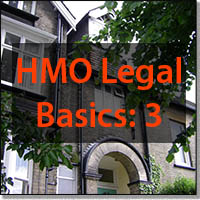 The HMO Legal Basics series is a collaboration between Tessa Shepperson and David Smith of Anthony Gold Solicitors. An HMO is a House in Multiple Occupation.
The HMO Legal Basics series is a collaboration between Tessa Shepperson and David Smith of Anthony Gold Solicitors. An HMO is a House in Multiple Occupation.
The Finance Act definition for Council Tax
You may already know that it is landlords (not tenants) who are responsible for Council Tax if the property is a House in Multiple Occupation. But did you know that the definition of an HMO for Council Tax purposes is NOT that of the 2004 Housing Act?
The definition is actually set out in Regulation 2 Council Tax (Liability for Owners) Regulations 1992.
The HMO part is Class C and says:
a dwelling inhabited by persons who do not constitute a single household, each of whom either:
(a) is a tenant of, or has a licence to occupy, part only of the dwelling; or
(b) has a licence to occupy but is not liable (whether alone or jointly with other persons) to pay rent or a licence fee in respect of the dwelling as a whole.(The Council Tax (liability for owners) Regulations 1992 S2)
So what are the differences?
Lets take a look at two situations.
1. Lets look at a property which is an HMO for licensing purposes because there are five friends living in it. So all of those friends are occupying the property on a single tenancy agreement which names them all jointly – so they would have a licence (ie be allowed) to occupy any part of the dwelling. They would be able to move around the property as they saw fit.
In this case it would NOT be an HMO for Council Tax purposes even though the property would be an HMO under the definition in the Housing Act 2004.
2. However, if a landlord were to let a house but reserve a room to store his possessions in, then the tenant would not have access to the whole dwelling. (Unlike 1 above).
So in this case it WOULD be an HMO for Council Tax purposes, even though the property is clearly not an HMO for licensing purposes
(See the Landlord Law Blog post here for a case on this situation).
This is a bit different from the Housing Act 2004 definitions as it is essentially dependent on what access the tenants have to the property.
It is important to be aware that there is this difference if you are talking about Council Tax as it is easy to get confused otherwise!
This confusion often extends to local authorities who will assume that properties with HMO licences are also HMOs for council tax purposes and aggressively pursue the landlord for unpaid bills.
If you have problems with your Local Authority
If you are being pursued by the local authority for council tax for an HMO and you believe that it is not your responsibility because all the tenants were on a single agreement then you should send a copy of the agreement to the council.
If they do not accept this then you need to take advice promptly as you will need to apply to the Valuation Tribunal to have the decision of the Council overturned. If the Council secures a liability order in the magistrates court it is very hard to defend this on the basis that you do not owe the tax.
Next time we will be looking at the definition of an House in Multiple Occupation for Council Tax Valuation purposes.
Further HMO resources:
![]() Advice: If you need some legal advice, for example if you have have been served with an HMO Declaration which you do not agree with, you can use our ‘HMO Hotline‘ telephone advice service.
Advice: If you need some legal advice, for example if you have have been served with an HMO Declaration which you do not agree with, you can use our ‘HMO Hotline‘ telephone advice service.
![]() Training: Easy Law Training has regular workshops on HMO Law & Practice. You can read about these >> here (you will need to scroll down to find out the dates).
Training: Easy Law Training has regular workshops on HMO Law & Practice. You can read about these >> here (you will need to scroll down to find out the dates).
There is a fairly common scenario called LHA 2+2 where a single AST is written to two benefit tenants BUT in the AST each tenant has exclusive use of 2 rooms and the total rent is split in a defined way between them. So they end up with 2 rooms each and share kitchen, bathroom etc. They do retain joints and several responsibility for the rent if one of them leaves. From a LHA perspective, they each claim as a single person.
How would this be seen by the council tax HMOS regs?
Steve,
I think your question contains its own answer to some extent. You state that each tenant has “exclusive” use of two rooms. By definition exclusivity means the right to exclude all others, including their fellow tenant. Therefore neither tenant has access to the entire dwelling. In other words they only have a right to occupy part of it. This would fall within the HMO liability definition.
Thanks for the clarification guys. These blog entries are very valuable.